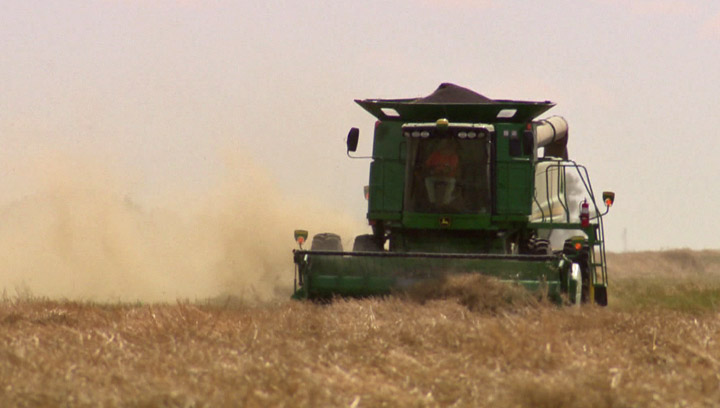EDMONTON – Prairie farm groups frustrated by delays in shipping grain this fall want the federal government to do more to penalize rail companies that don’t deliver crops in a timely way.

Doug Chorney of Keystone Agricultural Producers said the backlog is so bad that mountains of wheat and other crops are building up outside jammed grain elevators.
As prices fall, farmers are wondering what good a bumper crop is to them if they can’t get it to market.
“There is grain in piles across Western Canada,” Chorney said from Brandon, Man. “This creates big cash-flow problems for farmers. We all have bills to pay.”
Chorney and his counterparts in Saskatchewan and Alberta blame the major railways for not putting enough trains and grain cars in service to haul crops to ports for export.
They are also pointing their fingers at federal legislation proclaimed last June that was supposed to deal with such situations.
Norm Hall, president of the Agricultural Producers Association of Saskatchewan, said the Fair Rail Freight Service Act is just not effective.
He said the legislation needs to be amended to make it easier to hit railway companies with fines over transportation bottlenecks.

Get weekly money news
“There are no teeth … to make sure that it happens,” Hall said.
The legislation does include a provision for possible penalties of up to $100,000, but only if a government arbitrator decides a signed service agreement between a shipping company and a railway has been violated.
Chorney said that isn’t good enough.
“We need the federal government to listen to the concerns of farmers and grain shippers and introduce legislation that has impacts and consequences on the railways if they fail to provide timely and adequate service.”
Officials with Transport Canada and Agriculture Canada said they could not immediately respond.
Train transportation delays are a fact of life for Prairie farmers, but are usually caused by cold weather or severe winter storms that clog rail lines with snow.
Farm leaders say they can’t account for the delays this fall.
Some wonder if the railways are using more trains to haul oil. Others have heard reports that the companies have parked locomotives and grain cars to save money.
Earlier this month, Agriculture Minister Gerry Ritz said that he thought the railways were doing an “adequate” job moving crops to market.
Lynn Jacobson, president of the Alberta Federation of Agriculture, said whatever the reason, farmers who usually ship all of their grain by January might not get their crops to market until next June.
He is not confident the federal government appreciates the predicament that producers face.
“It is not going to get better any time soon,” Jacobson said from his farm near Enchant, Alta.
“We don’t have the lobby power with the government that the railway companies have.”
Jim Feeny, a spokesman for Canadian National (TSX:CNR), said the railway has been delivering more than 5,000 rail cars a week this fall to grain elevators for loading – about the same as last year.
The problem is the large volume of the harvest, he said, and adding more trains and rail cars would just overwhelm the grain system.
“It is physically impossible for the supply chain to handle it all at once,” Feeny said. “We are doing the best we ever have done in our history.”
Canadian Pacific Railway (TSX:CP) said it is working flat out to move grain, with deliveries 22 per cent higher than the company’s five-year average.
Ed Greenberg, a CP spokesman, said grain is the company’s single biggest commodity.
“CP has moved more grain the past 90 days due to the heavy harvest than ever before,” he said.

Comments